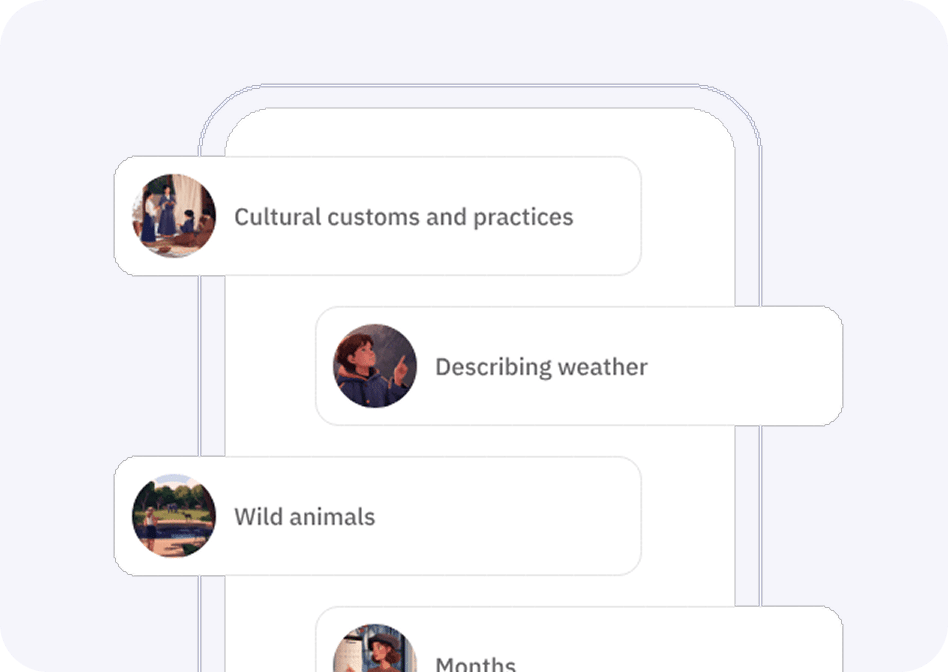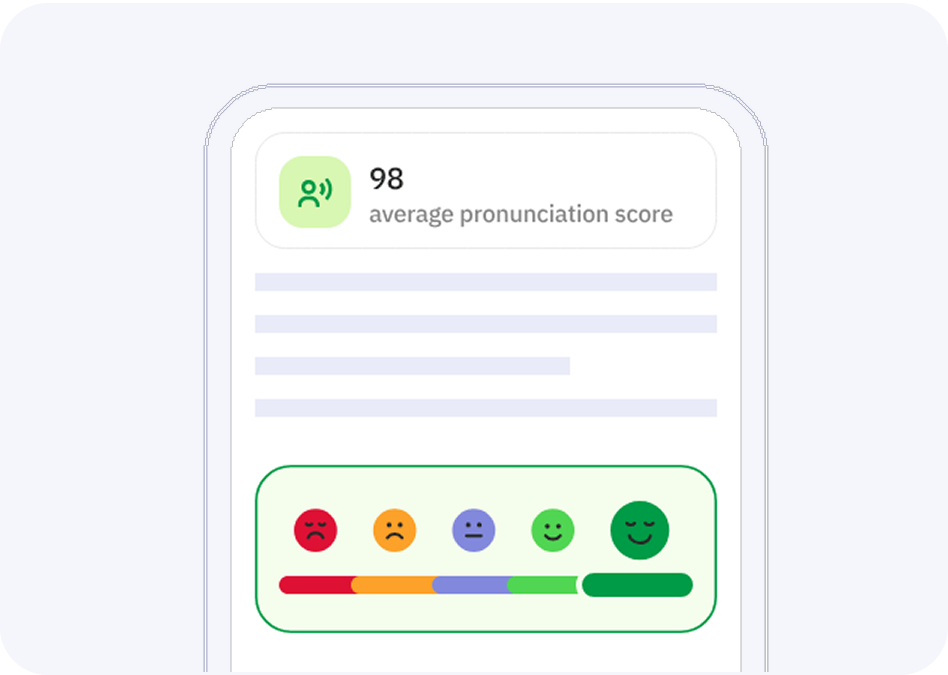Speaking German
Learning to speak German is a journey filled with exciting challenges and rewarding milestones. As the most widely spoken native language in Europe, German opens doors to cultural experiences, educational opportunities, and business prospects across Germany, Austria, Switzerland, and beyond. Whether you’re a traveler, student, or professional, mastering the German language can significantly enhance your communication skills and cultural understanding. This guide explores the importance of speaking German and introduces innovative learning tools like Talkpal AI that can help you on your language learning journey. Discover how speaking German can expand your horizons and connect you more deeply with the rich tapestry of German-speaking cultures.

The talkpal difference

Personalized Education
Every person approaches the study process differently. By leveraging Talkpal technology, we analyze the patterns of millions of learners at the same time to build highly effective educational structures. These insights allow us to create a curriculum that is fully customized to fit the specific needs and interests of every student.

Cutting-Edge Technology
Our main mission is to lead the way in providing a tailored educational journey for every user by utilizing the most recent developments in modern innovation. We strive to make high quality practice accessible to all through superior technical solutions and our advanced AI tutor.

Making Learning Fun
We have transformed the educational process into something truly entertaining. Since maintaining momentum can be difficult in an online setting, we designed Talkpal to be incredibly captivating. The platform is so engaging that users often prefer acquiring new skills with us instead of playing video games.
LANGUAGE LEARNING EXCELLENCE
The most efficient way to learn a language
Try Talkpal for freeIntroduction to Speaking German: Unlocking Opportunities
1. The Importance of Speaking German in Europe
German is a key language in Europe, serving as an official language in Germany, Austria, Switzerland, Belgium, and Luxembourg. Speaking German fluently can open up countless opportunities across these countries, whether in business, education, or travel. For professionals, the ability to speak German can notably enhance career prospects in various fields such as engineering, pharmaceuticals, automotive, and finance, all sectors in which German-speaking countries are global leaders. For students, proficiency in German can provide access to renowned universities and scholarships, making higher education more accessible and enriching.
2. Cultural Benefits of Speaking German
Beyond practical advantages, speaking German allows you to immerse yourself in a profound cultural heritage spanning literature, philosophy, music, and cinema. Germany’s contributions to arts and sciences are immense, with figures like Goethe, Schiller, Bach, and Beethoven hailing from German-speaking lands. By learning German, you gain direct access to their original works, experiencing them as they were meant to be understood. Cultural understanding fosters deeper connections with German-speaking individuals, enhancing both personal and professional relationships.
3. Travel Advantages with German Skills
Travelling becomes a more enriching experience when you can speak German. Navigating through cities like Vienna, Zurich, and Munich is much smoother when you can communicate with locals in their own language. Speaking German not only helps in everyday situations like ordering food and asking for directions but also allows you to understand cultural nuances and participate in local traditions and festivities. This linguistic skill empowers you to move beyond the tourist surface, experiencing a deeper, more authentic connection with the places you visit.
4. Business Opportunities Through German Proficiency
Germany is Europe’s largest economy and a powerhouse in global trade, making German an incredibly valuable language for international business. Speaking German provides a significant advantage in negotiations and partnerships with German companies, known for their precision and innovation. Knowledge of the language can facilitate networking, deal-making, and the establishment of trust and rapport with potential business partners, giving you a clear edge in a competitive market.
5. Educational Prospects and Scholarships
Speaking German opens up a broad array of academic opportunities. Many German universities offer programs in English, but having German skills can broaden your options, including access to courses and programs taught entirely in German. Additionally, proficiency in German might make you eligible for scholarships and funding opportunities, reducing the financial burden of studying abroad. This linguistic proficiency also enhances your learning experience, allowing you to fully engage with your peers and instructors in their native language.
6. German for Science and Research
Germany is a leader in scientific research and innovation. Fields such as engineering, chemistry, physics, and biology have strong roots in German-speaking countries, and many scientific papers are published in German. Speaking German can be crucial for researchers and academicians, as it facilitates access to a vast amount of resources and literature that might not be available in English. Additionally, collaborating with German research institutions can significantly propel your career and research projects.
7. Innovative Tools for Learning German: Talkpal AI
Embracing technology in language learning has never been easier with tools like Talkpal AI. This AI-powered platform offers interactive learning experiences, making it ideal for beginners and advanced learners alike. Talkpal AI helps you practice German pronunciation, vocabulary, and grammar in engaging, context-based scenarios. It’s designed to mimic natural conversation, which is crucial in mastering a language as nuanced as German. With features tailored to individual learning styles, Talkpal AI ensures that you can learn at your own pace and effectively progress in your language skills.
8. The Role of German in Arts and Literature
Speaking German can profoundly enhance your appreciation and understanding of German arts and literature. The language’s precise nature offers a different layer of insight into the thoughts and emotions conveyed in literature and performances. Knowledge of German allows enthusiasts to engage directly with a wealth of original texts and performances, gaining insights that are often lost in translation. This deeper understanding enriches the personal enjoyment and academic study of German arts, opening up new dimensions of interpretation and appreciation.
9. Advantages of Bilingualism in Cognitive Abilities
Learning to speak German also offers cognitive benefits. Bilingualism has been shown to enhance mental flexibility, problem-solving skills, and even delay the onset of dementia. The process of learning a second language like German can improve your brain’s elasticity and its ability to handle complex situations. This cognitive flexibility translates into better multitasking skills and improved memory, benefits that can aid in all areas of life, from professional to personal.
10. Community and Social Connections Through German
Speaking German allows you to connect with millions of native speakers and German learners worldwide, fostering a sense of community and belonging. Language is a powerful tool for building bridges between different cultures and societies. Participating in German-speaking communities—whether online or in-person—can enhance your understanding of the world, offer support in your language learning journey, and provide opportunities for cultural exchange and lifelong friendships. By speaking German, you’re not just learning a language; you’re becoming part of a global community.
The most efficient way to learn a language
Try Talkpal for freeFrequently Asked Questions
How long does it typically take to become fluent in German?
What are the benefits of speaking German in a professional context?
Are there any online tools to help with learning German?
Can speaking German help in personal development?
What is the best way to practice speaking German?







